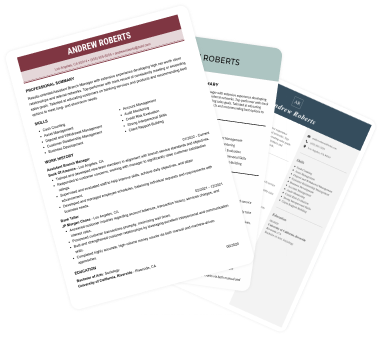Create a professional CV now!
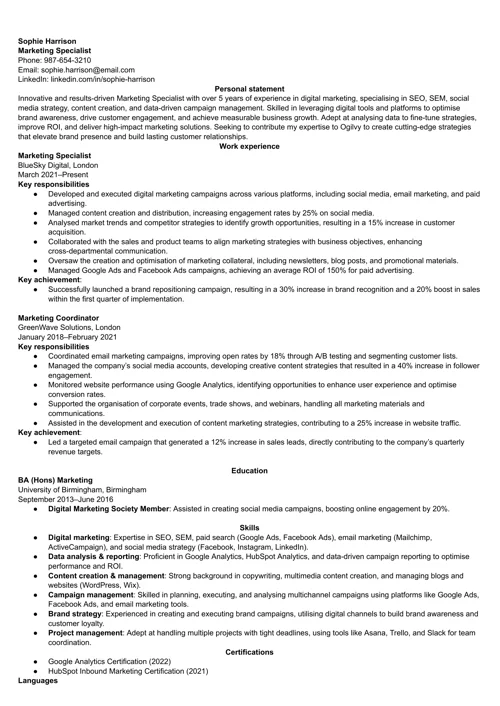 NO
NO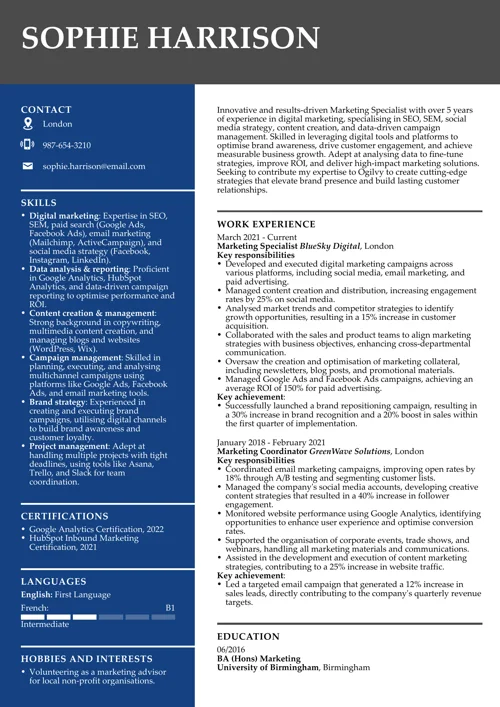 YES
YESLast updated on 29 December, 2025
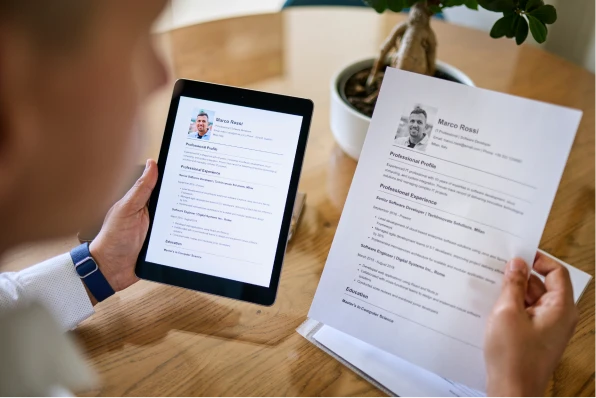
Digital skills are no longer just for IT roles. Today, employers in all industries—whether marketing, sales, HR, or finance—expect candidates to be comfortable with key tech tools. Whether it’s using data to support decisions, managing online content, or working through digital platforms, having the right digital skills can boost your career. In this article, we’ll highlight 10 essential digital skills that will help your CV stand out and give you an edge in the job market.
Create an effective CV in minutes. Choose a professional CV template and fill in every section of your CV in a flash using ready-made content and expert tips.
Create a professional CV now!
 NO
NO YES
YESWe created the sample on the left using our builder. See other good CV examples like this one.
Want to explore more skills? Take a look at these guides:
Digital skills are the ability to use technology to complete tasks, solve problems, and achieve goals. These skills are crucial in today’s workplace as they improve productivity, streamline workflows, and enhance overall business performance. Key digital skills include data analysis, digital communication, software proficiency, and adaptability to new technologies.
In the work environment, strong digital skills contribute to faster, more efficient processes, improved collaboration, and greater innovation. They enable employees to utilise software tools, manage online projects, and make data-driven decisions. Whether you're managing digital campaigns, utilizing CRM systems, or working with cloud-based platforms, digital skills are crucial to your success.
Below is a list of essential digital skills that can enhance your effectiveness in any workplace.
SEO is an essential digital marketing skill related to optimising website content and improving its ranking in search engine results. By using targeted keywords, enhancing site structure, and acquiring quality backlinks, you can boost organic traffic.
Social media marketing is a key skill helping to leverage platforms like Facebook, Instagram, Twitter, and LinkedIn to build brand awareness, engage with customers, and drive traffic to websites. With this digital skill, you’ll craft content strategies, track engagement metrics, and manage paid campaigns to reach your audience with impact.
Data analytics enables you to analyse and interpret large datasets using tools like Google Analytics, Excel, or SQL. With this skill, you can uncover trends, patterns, and customer behaviours to make data-driven decisions that power your digital marketing strategy.
Email marketing focuses on creating, managing, and optimising campaigns to engage customers, promote products, and retain audiences. Effective email marketers segment lists, conduct A/B testing, and analyse campaign performance.
Proficiency in CMS platforms like WordPress, Joomla, or Drupal is a valuable digital marketing skill that allows you to create, manage, and update website content. With this skill, you’ll efficiently build websites, integrate multimedia, and optimise user experiences.
A strong CV summary will convince the recruiter you’re the perfect candidate. Save time and choose a ready-made personal statement written by career experts and adjust it to your needs in the LiveCareer CV builder.
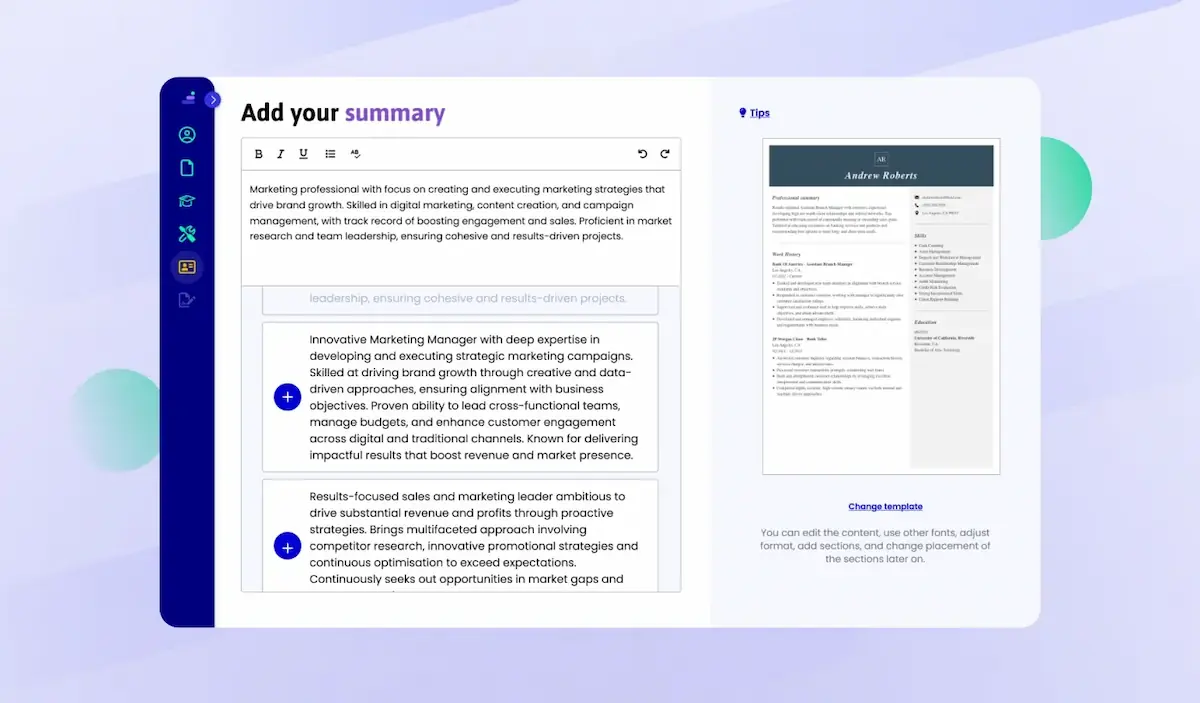
PPC management helps you run paid advertising campaigns on platforms like Google Ads or Facebook Ads. You’ll handle budgeting, target audience selection, and campaign optimisation to ensure you’re getting the best return on investment using CPC and conversion tracking.
E-commerce management is a skill you can use to oversee online stores and digital transactions, including product listings, payment processing, and customer service. With platforms like Shopify or WooCommerce, you’ll ensure seamless shopping experiences for customers.
UX/UI design focuses on creating user-friendly websites and applications by enhancing user experience (UX) and user interface (UI). Designers use wireframing, prototyping, and visual design to ensure easy navigation and appealing digital platforms.
With video editing and production skills, you can create and edit professional videos for marketing, social media, and content campaigns. Using tools like Adobe Premiere Pro or Final Cut Pro, you’ll produce engaging, high-quality content that captivates your audience.
Cloud computing allows you to manage and store data on platforms like Google Drive, AWS, or Microsoft Azure. This skill supports flexible, scalable data storage, collaboration, and remote access, which is essential for modern business operations, including your digital marketing efforts.
Now that you're familiar with the essential digital skills, let's explore practical ways to enhance them. This is to help you stay ahead of the curve and contribute more effectively to your organisation’s goals.
The digital market is constantly changing, so you must stay informed about the latest tools, technologies, and trends. Follow industry blogs, podcasts, and webinars to be up-to-date and ensure your skills remain relevant.
Familiarise yourself with key software and platforms used in your industry. For example, learn the ins and outs of content management systems (CMS), project management tools, or data analytics platforms like Google Analytics. Employing these tools will improve your efficiency and make you more valuable to your team.
Search Engine Optimisation (SEO) is critical for driving online traffic. Deepen your understanding of SEO strategies, including keyword research, content optimisation, and link building. This knowledge will enhance your digital marketing efforts and increase visibility for your business or clients.
Social media is a powerful tool for brand awareness. To enhance your social media skills, experiment with different platforms, learn analytics tools, and create targeted content strategies. Mastering these techniques will allow you to engage effectively with your audience.
While not essential for every role, having a basic understanding of HTML, CSS, or JavaScript can set you apart in a digital-first world. Learning how to make simple changes to websites or troubleshoot issues can make you a more versatile and valuable team member.
Data-driven decisions are at the core of most digital strategies. Learn how to interpret data using tools like Google Analytics or Excel to generate insights, track performance, and optimise your digital campaigns for better results.
Email marketing remains a top method for customer engagement. Learn how to design email campaigns, segment audiences, and analyse open rates and conversions. Familiarity with platforms like MailChimp or HubSpot will help you run effective email marketing campaigns.
Mastering digital communication tools like Slack, Zoom, and Google Workspace will help you collaborate more effectively with teams across different locations. Learn how to manage projects, share files securely, and communicate clearly in virtual environments.
If you’re in retail or sales, understanding e-commerce platforms such as Shopify or WooCommerce is essential. Learn how to optimise product listings, track sales performance, and manage online stores to drive business growth.
With digitalisation comes the risk of cyber threats. Strengthen your understanding of cybersecurity best practices to protect sensitive data and ensure the security of your digital tools and accounts. Regularly updating passwords, using encryption, and being aware of phishing attempts can help protect your digital presence.
Digital skills are essential in today’s workplace as they enhance productivity, streamline workflows, and improve job performance. Employees who are proficient in digital tools, data analysis, and online communication can work more efficiently, meet deadlines, and manage multiple tasks with ease.
These skills also improve teamwork by facilitating seamless communication and collaboration across digital platforms. They help businesses optimise operations, reduce errors, and leverage technology to stay competitive. Whether you're in marketing, data analysis, or customer service, strong digital skills are crucial for driving innovation and improving overall performance.
Digital skills are essential at every job level. They demonstrate to employers that you can leverage technology to manage tasks, analyse data, and communicate effectively, making you a valuable and adaptable team member. Highlighting these skills on your CV is crucial, especially in tech-driven environments.
Your CV profile (also called a CV summary) makes the first impression on a recruiter, so use it to immediately showcase your digital expertise. This brief paragraph at the top of your CV is the perfect opportunity to demonstrate your proficiency in digital tools, data analysis, and online communication. Here’s an example of how to introduce these skills:
Digital skills examples in the CV summary
Innovative and results-driven Marketing Specialist with over 5 years of experience in digital marketing, specialising in SEO, SEM, social media strategy, content creation, and data-driven campaign management. Skilled in leveraging digital tools and platforms to optimise brand awareness, drive customer engagement, and achieve measurable business growth. Adept at analysing data to fine-tune strategies, improve ROI, and deliver high-impact marketing solutions. Seeking to contribute my expertise to Ogilvy to create cutting-edge strategies that elevate brand presence and build lasting customer relationships.
This is where you can really highlight how your digital skills have made a difference. The work experience section is the best place to demonstrate how you’ve used digital tools to get things done efficiently, hit targets, and solve problems.
To make it stand out:
Job description with essential digital skills—example
Marketing Specialist
BlueSky Digital, London
March 2021–Present
Key responsibilities
Key achievement:
You don’t have to be a CV writing expert. In the LiveCareer CV builder you’ll find ready-made content for every industry and position, which you can then add with a single click.

If you're just starting in your career or still studying, your professional experience might be limited. However, your education section can still highlight your digital skills effectively. Focus on coursework, projects, or extracurricular activities that demonstrate your proficiency with digital tools, platforms, or technologies. For example, you might mention classes that involved data analysis, digital marketing, or the use of software like Google Analytics or social media platforms. You could also highlight activities where you applied digital tools to coordinate projects, manage online campaigns, or analyse data.
Examples of digital skills in the education section
BA (Hons) Marketing
University of Birmingham, Birmingham
September 2013–June 2016
The skills section of your CV is the place to show off your digital know-how. Instead of listing every tool you’ve ever used, focus on the ones that fit the job you’re applying for. Employers want to see the digital skills that matter most to their role.
Examples of digital marketing skills in the skills section
Adding extra sections to your CV can help you stand out and show off the digital skills that give you an edge. These sections are a great place to highlight technical know-how and interests that support your main experience and qualifications. Here are a few ways to do it:
Digital skills examples in the extra sections
Certifications
Languages
Interests
What makes a digitally strong CV? It’s one that clearly shows you’re confident using digital tools and platforms to manage tasks, solve problems, and work efficiently. Back this up with real examples from your past roles—like running online campaigns, using analytics tools, or managing content systems. A tailored, well-written cover letter is another great way to show your digital strengths. Use it to explain how you’ve used technology to streamline processes or improve performance. Even in today’s fast-paced hiring landscape, most employers still value a solid cover letter that connects your skills to the role.
Once your CV lands you the interview, it’s time to show how your digital skills make a real impact. Be ready to talk through examples where you’ve used tech to streamline work, solve problems, or improve performance. Recruiters often ask how you’ve applied digital tools—like CRM platforms, social media schedulers, or analytics dashboards—to deliver results.
Use the STAR method (Situation, Task, Action, Result) to structure your answers. Highlight tools you’re confident with (e.g., Google Analytics, Trello, HubSpot), and explain how you used them to meet deadlines, track progress, or drive engagement. If possible, share data to back up your achievements,and don’t forget to mention any feedback or recognition you’ve received for your digital strengths.
A cover letter alone simply won’t be enough—you need an impactful CV, too. Create your CV in minutes. Just follow our wizard and fill in every CV section with ready-made content. Get started by choosing a professional CV template.
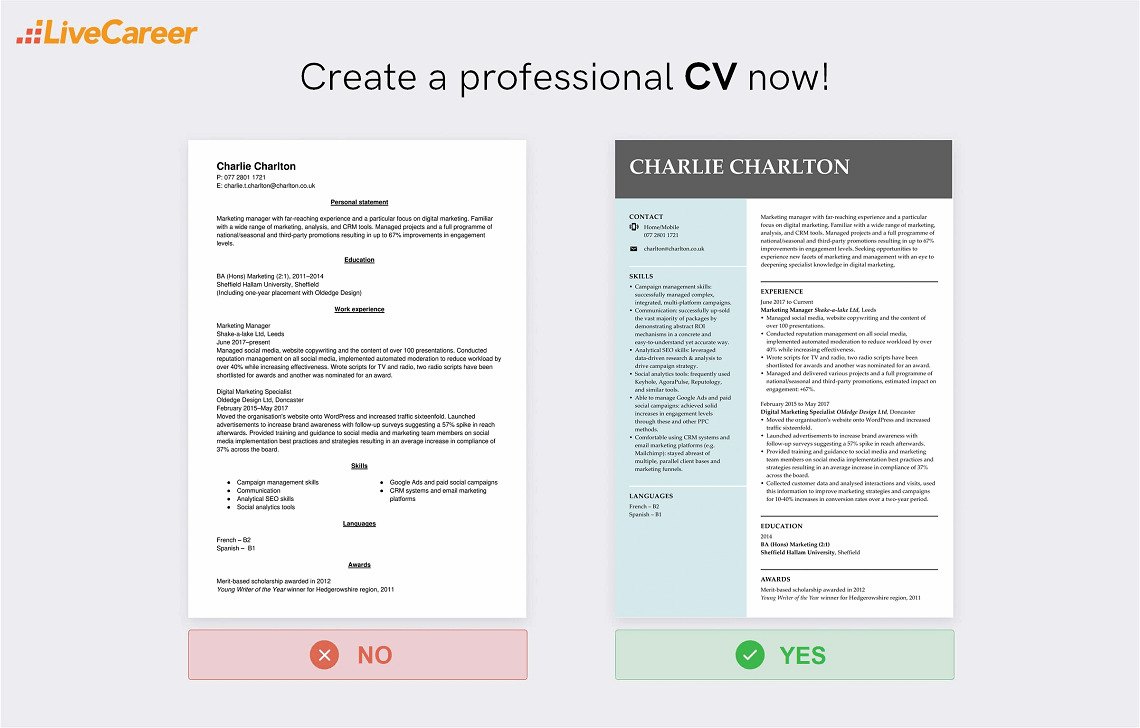
Thanks for reading! If you’re not quite sure how to highlight your digital skills on your CV—or how to tailor them to specific roles—drop a question in the comments. We’re happy to help.
Our editorial team has reviewed this article for compliance with Livecareer’s editorial guidelines. It’s to ensure that our expert advice and recommendations are consistent across all our career guides and align with current CV and cover letter writing standards and trends. We’re trusted by over 10 million job seekers, supporting them on their way to finding their dream job. Each article is preceded by research and scrutiny to ensure our content responds to current market trends and demand.
Category: CV Help
Crafting a job-winning CV is all about showcasing your unique skills and experiences. Start with a strong personal statement that highlights your career goals and achievements.
Try Our CV Builder Now